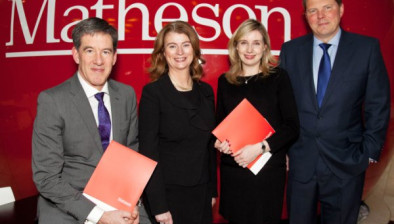Mark O’Sullivan: Tax credits a significant ‘pull factor’ for multinationals operating in Ireland

Mark O'Sullivan
Matheson partner Mark O’Sullivan and senior associate Anna Crowley examine how Ireland is persevering as an attractive destination for foreign direct investment.
2022 was another year when major changes affecting global tax rules were agreed and as a result the tax landscape in Ireland is likely to undergo a material overhaul from 1 January 2024.
The introduction of the new global minimum tax proposed by the OECD has been well heralded and most readers will be familiar with the proposed move to a minimum 15 per cent rate of tax for multinationals over a certain size (€750m in annual revenues). The EU has finally reached an agreement on the implementation of the OECD’s minimum tax, following some resistance from Hungary and Poland.
As the standard rate of tax for trading income in Ireland is currently 12.5 per cent, this change will impact most of the large multinationals operating in Ireland and will likely require many of them to pay a top-up tax to ensure that their effective rate of tax in Ireland is at least 15 per cent.
On a positive note, the 12.5 per cent rate will remain in place for groups with revenues below the €750m mark. According to modelling estimates from the Department of Finance, the new regime would apply to 56 domestic, and 1,500 foreign-owned, multinationals based in Ireland.
As all EU countries will need to adopt the new 15 per cent minimum rate it should level the playing field when providing tax-based incentives for multinational investors looking to establish operations in the EU. However, as most other EU jurisdictions competing for inward investment have a higher rate than 12.5 per cent, Ireland should continue to be an attractive location for multinationals. Some tax incentives should still be attractive following the introduction of the 15 per cent minimum tax rate, chief among them are refundable tax credits.
Ireland has shown a willingness to react quickly to these international tax changes. One example is the Research & Development (R&D) tax credit which has been in place for almost two decades. The new minimum tax regime and changes which were made to US foreign tax credit rules in 2022, would mean that the R&D credit available in Ireland would become unattractive if changes were not made to ensure it was treated as a refundable credit.
The Irish government moved proactively in last year’s Finance Act to ensure that the credit remains an important attraction for the most innovative companies looking to create high-value positions in Ireland. While the existing regime had an element of refundability, under the new change the credits are now immediately refundable (albeit over a three-year period).
Further changes which would ameliorate the complexity and administrative compliance burden for taxpayers claiming the R&D tax credit would also be welcomed. While it is important that the relief is policed and administered effectively and appropriately by the Irish tax authorities, there is a growing sense that the manner in which the relief is administered is at odds with the vision of policymakers looking to attract investment to Ireland. The simplicity, certainty and ease of administration of a relief are frequently just as important as its net benefit.
The EU has continued to demonstrate its desire to introduce new tax measures which would impact corporate tax, particularly in the area of disclosure and transparency. Following agreement on the new minimum tax rate, continued efforts are also being made to introduce uniformity in how tax bases would be calculated across the EU. It failed in this exercise several years ago when trying to introduce a Common Consolidated Corporate Tax Base (CCCTB) and has replicated its efforts under the guise of a new more-pronounceable acronym, BEFIT (Business in Europe: Framework for International Taxation).
Ireland has adapted to changes and has a host of other benefits that continue to make it an attractive destination for foreign direct investment. In recent years, it has become apparent that Ireland’s ‘pull-factors’ have changed since a decade ago. With a levelling of the playing field in the area of taxation, our access to the EU market (particularly since Brexit), political stability and the availability of a young, diverse and highly educated workforce, have made Ireland a key location for multinational companies looking to access the EU marketplace.
What can we expect for the remainder of 2023? While there have been some shaky economic signals over the past 12 months brought about by the war in Ukraine and the ensuing energy crisis, as well as a general slow-down in the tech sector, 2022 was still a very good year for foreign direct investment into Ireland. In its annual report released in December 2022, the Irish Industrial Development Agency (IDA) announced that over 24,000 (net) new jobs were created in 2022 with 242 new investments, and 103 of those were new investors into the Irish market. We expect this trend to continue into 2023.

- Mark O’Sullivan is a tax partner and Anna Crowley is a tax senior associate at Matheson LLP. This article first appeared in the Irish Examiner.







